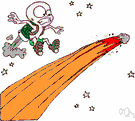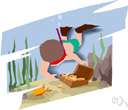locomotion
Also found in: Thesaurus, Medical, Encyclopedia, Wikipedia.
lo·co·mo·tion
(lō′kə-mō′shən)locomotion
(ˌləʊkəˈməʊʃən)lo•co•mo•tion
(ˌloʊ kəˈmoʊ ʃən)n.
lo·co·mo·tion
(lō′kə-mō′shən)Locomotion
(See also VEHICLES.)
piggyback Carried on the back or shoulders like a pack; pertaining to the carrying of one vehicle by another. This term, like its 16th-century counterpart, pick-a-back, is of unknown origin. In contemporary usage, piggyback usually refers to carrying a child on one’s shoulders or carrying a truck trailer on a railroad flatcar.
ride shanks’ mare To walk; to go on foot. This expression employs a wry twist on shanks ‘legs’ to imply, especially to the uninitiated, that Shanks is actually the name of the owner of a horse which is to be used as a means of conveyance. Common variations substitute pony, nag, horse, etc., for mare. The closely allied shank it means ‘to walk.’ Related drolleries include go by the marrow-bone stage and ride Walker’s bus.
| Noun | 1. |  locomotion - the power or ability to move locomotion - the power or ability to move mobility - the quality of moving freely |
| 2. |  locomotion - self-propelled movement locomotion - self-propelled movement movement, move, motion - the act of changing location from one place to another; "police controlled the motion of the crowd"; "the movement of people from the farms to the cities"; "his move put him directly in my path" brachiation - swinging by the arms from branch to branch step - the act of changing location by raising the foot and setting it down; "he walked with unsteady steps" gait - a horse's manner of moving running, run - the act of running; traveling on foot at a fast pace; "he broke into a run"; "his daily run keeps him fit" crawling, creeping, crawl, creep - a slow mode of locomotion on hands and knees or dragging the body; "a crawl was all that the injured man could manage"; "the traffic moved at a creep" dance step, step - a sequence of foot movements that make up a particular dance; "he taught them the waltz step" stroke - any one of the repeated movements of the limbs and body used for locomotion in swimming or rowing |